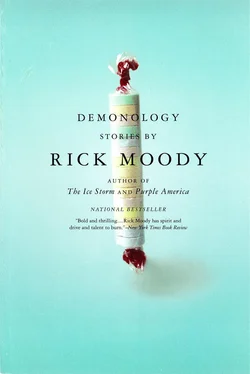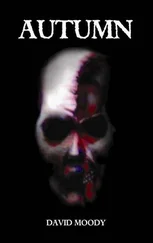Julian didn’t say anything. Because there was history between them, Gerry knew intuitively that Julian hadn’t talked to anyone that night, hadn’t said a word to any of the other kids, hadn’t spoken to any girl, hadn’t even attended the party, if attendance meant exchange of human pleasantries. Peltz, when born, had been rubber-stamped Lonely No Matter What, so it seemed, didn’t matter what crowd he was in, what birthday he was celebrating. He was sixteen years old, but he might as well be forty, or sixty-three, or eighty-five. The valleys of his character were carved out and he would dwell in them from now on. Gerry understood what it was like to have a friend with bad prospects, a homely friend. It didn’t mean that you didn’t care for someone, just because they were awkward or had horrible acne or rarely went outside. On the other hand, it was also important to know when a friendship was stale.
You know the reputation that Percocet has, among major pain relievers, for nightmares, for taking the component material of dreams and distorting them? Part of chronic pain, when you are a sufferer thereof, as Gerry Abramowitz was, at the time of this remembering, had to do with terror, simple implacable terror, the atavistic memories like I’m going to be left out on the steppe and fed upon by wolves, because of my disability. If you closed your eyes, on this your present medication, to embark on the family of human experiences known as memories, you’d find that you were automatically inclined toward the most painful of these reveries, as if Percocet, especially when taken in excess of the recommended dosage, could relieve physical discomfort only by creating a mental analogue. So when Gerry embarked on this outline of the Foster’s Halloween party, in recollection, a bleak outcome was assured.
— Want some of this beer? Julian had evidently found a can somewhere on his travels. It foamed liberally. He handed it over to Gerry for a sip. — I’ve been thinking, about the plan, and you know, about whether or not it was a good plan. And I decided that for me, it really wasn’t that good. I had some reservations, about the rules and regulations of it, you know, even at the beginning. And not just because I don’t think I ever, you know, just had a conversation with a girl. Not even once. Well, maybe once or twice, but not very many times. I should have known, but I realized pretty fast, you know, that I couldn’t get anywhere near where you were going to get with all those heiresses, because you’re a natural. You’re a guy, and everybody likes you, and when you walk into a room, everybody’s happy that you’re there, even if they don’t show it, and I thought about how the plan, well, it had a thing about it that wasn’t on the level. You know, there was a part of it that wasn’t entirely honest, and the more I was out here thinking about it, the more I was thinking that maybe I just couldn’t live up to it exactly. Not in the way I thought it. Because I just can’t talk to people the way you can talk to people, I get panicky, then I do something stupid. And so that’s why I went out the window of the bathroom. It was a small window. There were a couple of kids outside who saw me come out, you know, out of the window, but I didn’t want to explain. So I just ran off into the woods. I sat out there in the woods, and my ass got really moist, from sitting on stumps and logs. And that’s how it went.
They passed the can of beer back and forth.
— So you’re saying I went through a conversation where I asked Dinah Polanski to kiss me —
— You asked her to kiss you?
— While you were going out the window of the bathroom?
— Well… yeah.
— And why did you do that?
Some people had cruelties inflicted on them because cruelties had been inflicted on them in the past. These initial cruelties acted as magnets for further cruelties. You saw the wound, you saw the way victim loved the wound, you saw the way he tended it, how lovingly, how pridefully, and you couldn’t do anything but reopen this wound. In fact, it was almost pleasurable to be the source of renewed trauma for this unfortunate, because it was something the victim knew well. Therefore, you were reassuring him even while you were inflicting discomfort. That’s how it was. Friendships turned on a dime. When Gerry ran off and left Julian on the golf tee, on the winter tee, when Gerry went to join the throng beside the creek, he knew he was doing something awful, but the worst part was that he had no remorse. There was a total absence of sympathy for Julian. He couldn’t even imagine there was an inside to Julian Peltz; he couldn’t imagine that Julian wasn’t just some ugly kid with braces on his teeth who worked at the library and who was constantly hanging around. It was only later that Julian’s face, receding in sheets of night, floated through the heavy conscience of Gerry Abramowitz.
Wearers of sheets prepared for a migration across the river. Down into the river they went, allotheistic teens, shawls wrapped snugly around them, to ford the river called Tokeneke, rock by rock. Toward what goal did they proceed? Toward Nicky Foster, on the far bank, where, lubricated by the consumption of beers, Nicky was preparing to set fire to his familial acreage. In its entirety. He had a gallon of high-octane fuel, he had a tiger in his tank. His pyrotechnics would begin with a bonfire, and then it would engulf the entire far side of the river. The fire would have to travel almost a half-mile before it would hit the Goodells’ house, over on Hamilton, and the local volunteer fire department would arrive way before that. There were spots where there were no trees anyhow, just underbrush. Nicky would call the fire department himself, since he had learned the number for all local emergency personnel in the pursuit of a certain merit badge in his troop of boy scouts. There would be no accident or injury. And his audience, the faithful, would be transfixed by his spectacle. The first drenched handful of them, one or two sliding down the muddy bank and back into the river, now labored to reach Nicky’s side. They clutched at roots and branches, pulled themselves from the creek. Where was Julian Peltz now? In that forest somewhere, so that he, the other Jewish kid, could serve as the appropriate sacrifice for Nicky Fosters destruction of property? Tied to a sugar maple and left to broil?
It was like Gerry had offered him up.
Polly Firestone, her name afterward an emblem for the excesses of the Fosters’ party, stretched out a hand to Nick Foster. Nick helped her up onto the bank. She fished in the pocket of her nondescript corduroy trousers, which she wore underneath a twin-sized sheet, for a disposable lighter, one made by a large multinational plastics corporation. Nick took the proffered lighter, struck it in the conventional way, and before the rest of the kids were even up on the bank, the bonfire lit up that Halloween. A pair of cedars was engulfed. Some eyebrows were singed. It was all more than they had ever expected in their short, careless lives.
His mother’s paper on the circumstances of the party and the reaction to it in the local press, which later appeared in the Deviant Behavior biannual (volume nineteen, number two), turned on a line from Nietzsche, as Gerry interpreted it in his middle life, Rejoicing monsters, they are capable of high spirits as they walk away without qualms from a horrific succession of murder, arson, violence, and torture, as if it were nothing more than a student prank. His mother’s prose was subdued, with a faint trace of wistfulness: The songs of contemporary youth worship imaginary possibilities immanent in abstraction: liberty, heroism, revolution. But more practically the freedom connoted in these lyrics, to take the first example, is the abandonment of pregnant women, the abuse of controlled substances, the victimless defrauding of banks and financial institutions, narcissism, selfishness, untimely death. A lineage might be supposed in which libertarian and anti-governmental rhetoric leads directly to destruction of property and violence against parents and leadership entities. See below, e.g., deposition statements of defendants in what I’m calling the Foster Case. I have appended the testimony of one boy, sixteen, who I’ll call Jim, accidentally injured when abandoned in the woods by other party-attendants. The reliable conclusion is that restriction is the proper environment for youth, that time of life that I can only refer to as ethical apprenticeship, during which privileges such as decision making and liberty ought to be controlled, abridged, even eliminated for a period of about seven years from onset of puberty, while ethical and normative values are instilled. Arrest, according to this formulation, is benevolent, arrest is compassionate, arrest is creative, arrest is planning for a serene future.
Читать дальше












